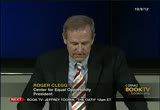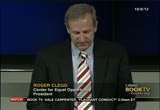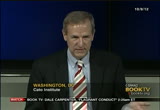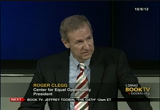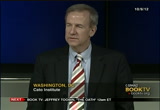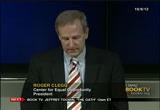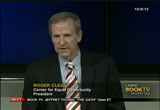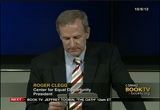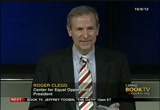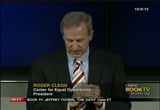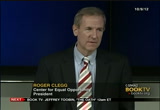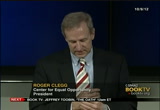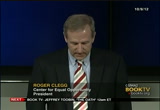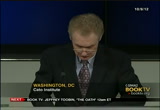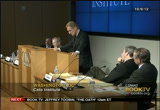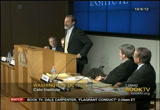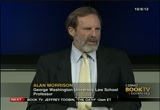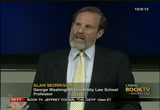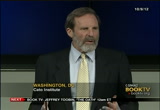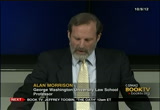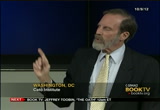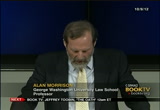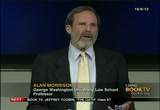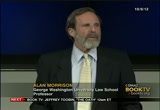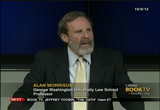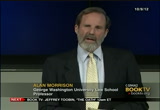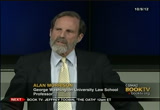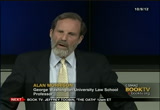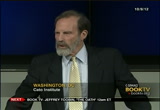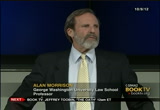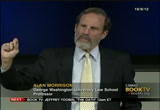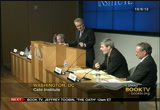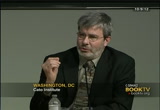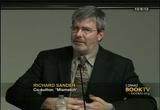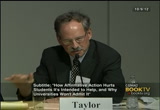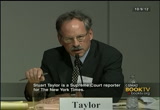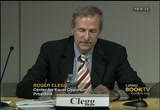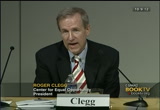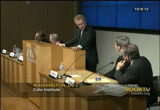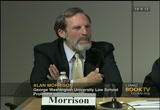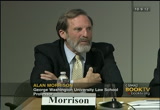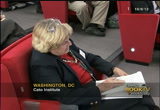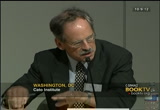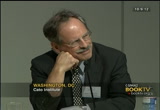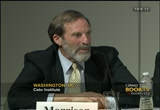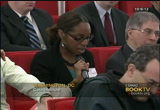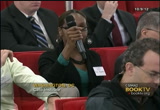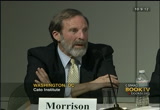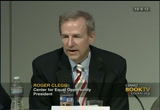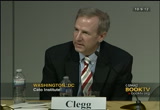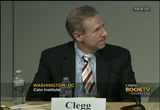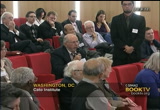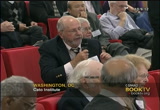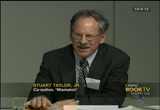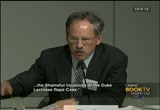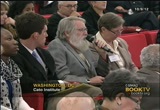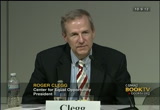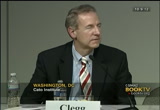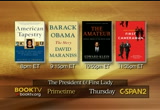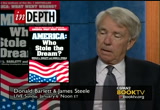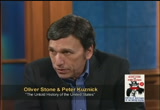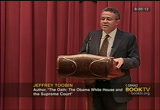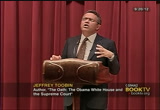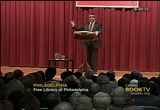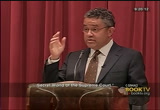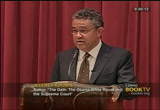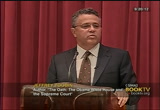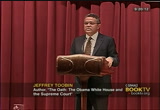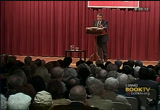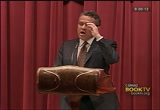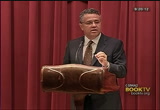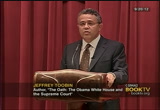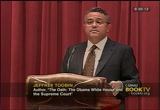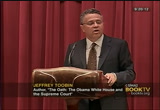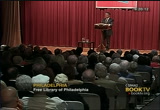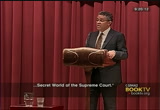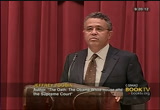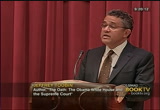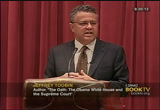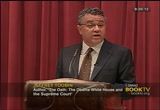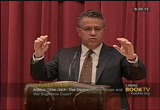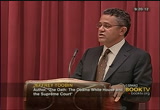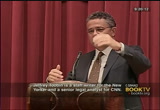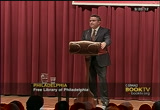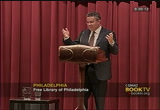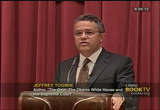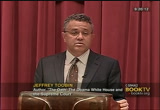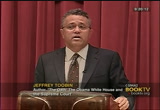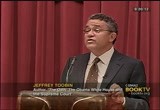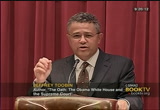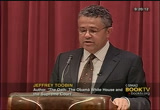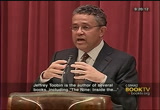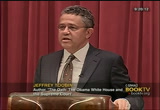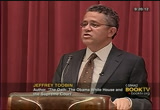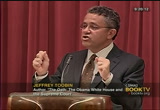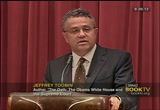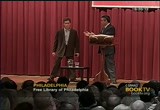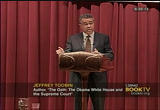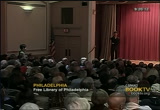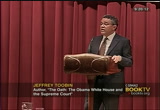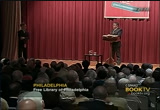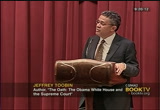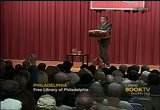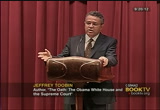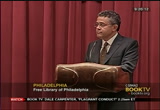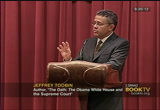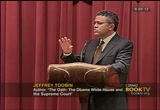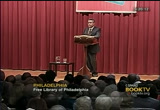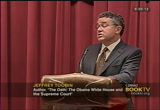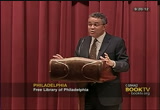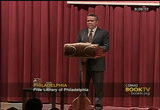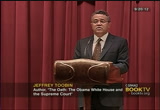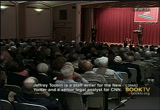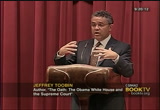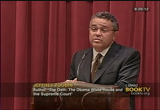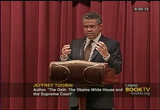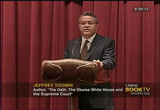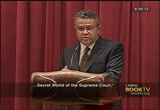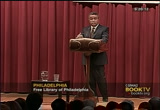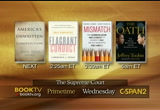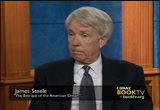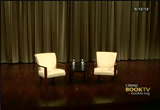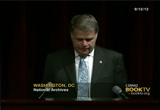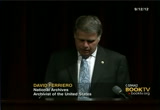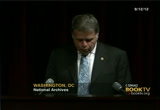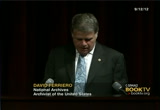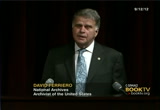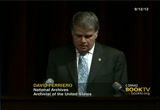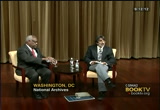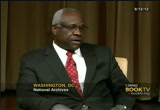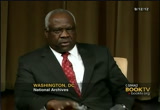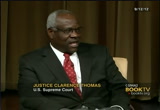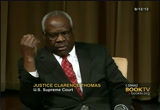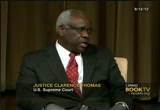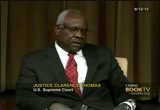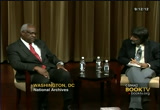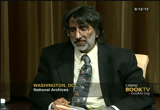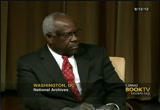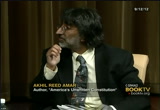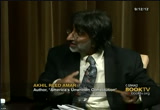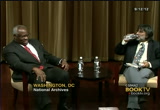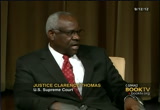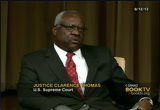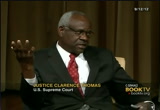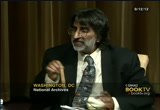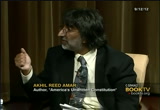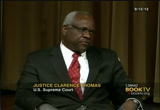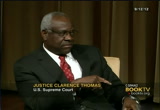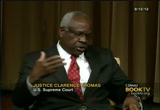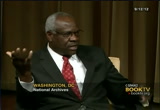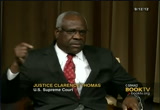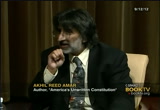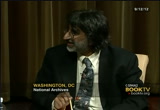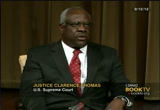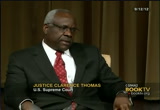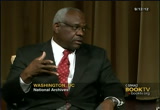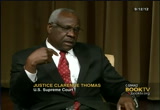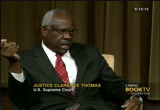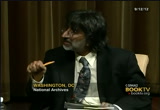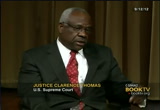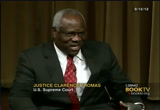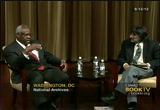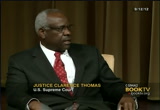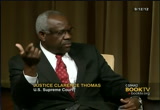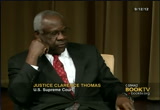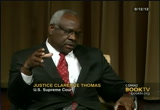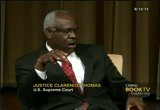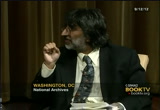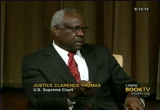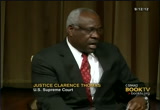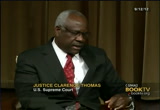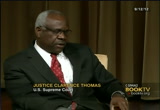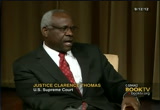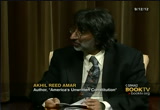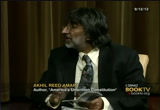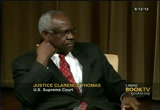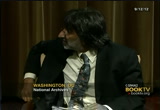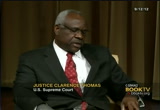tv Capital News Today CSPAN December 26, 2012 11:00pm-2:00am EST
11:01 pm
>> be subjected to discrimination under any program or activity receiving federal financial assistance. that is what happened to abigail fisher. it is not disputed. she was treated differently because of her race and color and national origin. now, we are not going to be talking so much about title vi my when we talk about the constitution. the supreme court said it doesn't really mean what it says. we just think it means what the constitution means. constitution has a little bit more wiggle room. although knobloch or the constitution guarantees equal protection of the law, and the
11:02 pm
outlaws the whole purpose of it the 14th amendment was to outlaw racial standards. that seems pretty straightforward. there was an act of 1981 that been racial discrimination, including in regards to college tuition. it sounds pretty straightforward. think of those things not mean what they say. there is an exception in this area. you would think, well, gee, it would be an exception. it would be an exception to the principle of racial discrimination that is pretty clearly there in the law. the federal branch have spoken
11:03 pm
to that. it must be pretty strong and undeniable. it must be something like, you know, it helps us identify someone who is about to set up a nuclear bomb in new york city or something like that. it is very compelling. well, the argument is that if you use racial determination for college admissions, it is likely that there will be somewhat more -- somewhat more of unrehearsed, interracial conversations are in especially among students. under the african-american kids and a latino kids who get these
11:04 pm
preferences -- they will say something to the white kids and asian kids that have overwhelming compelling educational benefits for them. that is a argument that the university of texas is arguing. that is an exception of non-discrimination that the supreme court has recognized. okay? okay. i think that's ridiculous. and, indeed, the reason the court buys this is because there are social sciences out there and scientists who say this is true. now, increasingly, these educational benefits, which, you know, make only marginal improvements to education access, they are disputed.
11:05 pm
you know, it is increasingly disputed that their are any educational benefits. but i think it is also important for the court to bear in mind, and i think the court's jurisprudence is moving this way. even if there are some educational benefits, they have to be weighed against the cost that are inherent in engaging in this discrimination. something is compelling. and you have to consider the inherent liabilities and racial discrimination that involves as well. well, what are some of the costs of racial discrimination? well, i should know this by heart, but i do not.
11:06 pm
i post on comment sections on websites often. here it is. the cost of racial discrimination in admissions. it is personally unfair. it passes over better qualified students. disturbing legal and moral precedent and allowing racial discrimination. it creates resentment. it stigmatizes the so-called beneficiaries in the eyes of their classmates, teachers, and themselves, as well as future employers, clients, and patients. it fosters the victim mindset, removes the incentive for academic excellence, and encourages separatism. it compromises the academic mission of the university and lowers the overall academic quality of the student body. it creates pressure to discriminate graduates. it breeds hypocrisy and encourages this type of attitude among officials.
11:07 pm
those there on a academic scale that is not fair, how much blood is needed to establish membership? i didn't even mention this book, "mismatch." in addition to the chapter that is irrefutable on documentation for why this is a real problem, it also touches on some of these other problems that i have just listed. if you add all this up, okay? me that it is a lot stronger than the educational benefits from these random interracial conversations that we might be having more of his racial preference in admissions.
11:08 pm
well, let me wrap up with one happy note and one not so happy note. it seems to me that one reason why we ought to end this nonsense now, it's is because of the changing face of america. all right? forty or 50 years ago, there was predominantly a black-and-white country. and you have a lot of people who had only recently been discriminated against. we have been living under a jim crow system. now, we are talking about those born in 1994.
11:09 pm
it doesn't seem like very long ago. that's 34 years after the 1964 civil rights act. according to the latest census, one in four americans describe themselves as being something other than black. african-americans are not the largest minority group anymore. they have not been for a while. latinos are a larger minority group. neither one of them is the fastest growing racial minority group. the fastest growing one is asian american. white americans are growing only had a 5.7% rate. another rapidly growing group of people like our president. who could check more than one box in the race and ethnicity section of their questionnaire. it seems to me that we cannot
11:10 pm
have a legal regime that sorts people according to their skin color and what country their ancestors came from. and treat some people better and other people worse based on what boxley check. okay? now, frequently the people who are arguing in favor, and i think this issue all the time, let me tell you. two minutes and today we are not talking about the educational benefits within a conversation. we are talking about slavery. we are talking about racial disparities. you know, even the academics don't really believe in these compelling interests from an original point of view. that is not really their focus. so why we have these racial disparities? you know? isn't at all because of slavery?
11:11 pm
well, last year the federal government cannot let it be known. but they came out with the most recent figures great 72.5% of african americans now are born out of wedlock. 72.3%. american indians, 66.2%. latinos, 53.3%. white people, still pretty high, 29.1%. for asian people, it is 17.2%. so in other words, seven out of
11:12 pm
10, six out of 10, five out of 10 for blacks and american indians and latinos because they are the so-called underrepresented in minority who get racial preferences. and a two out of 10 people are typically have racial problems. not only in terms of education but in terms of crime and whatever social indicators that you want. now, that is the real problem. of course, that is not going to be fixed by racial preferences. thank you. [applause] >> thank you, roger. now we will hear from alan morrison, who is the lerner family associate dean for public interest and public service law at the george washington university school of law. he is responsible for creating
11:13 pm
pro bono opportunities for students, bringing a wide range of public interest programs to the law school, encouraging students to seek positions in the nonprofit and government sectors, and assisting students to find ways to fund legal education to make it possible for them to pursue careers outside of traditional law firms. most of his career, deena morrison work for the public citizen litigation group, which she cofounded with ralph nader in 1972, and directed for over 25 years. his work included open government, opening up the legal profession, suing agencies that failed to apply comply with the law, protecting the rights of consumers, and protecting unrepresented class members in class action settlements. he has argued 20 cases in the supreme court, including victories in the virginia state board of pharmacy, virginia citizens consumer council,
11:14 pm
making it subject to the first amendment. and striking out over 200 federal laws containing the legislative veto is a violation of separation of powers. he previously taught at harvard, stanford, hawaii and american university law school spirit he is a member of the american academy of fellow lawyers, and was the president from 1999 until 2000. he is a graduate of the yell university and harvard law school, served his commission as officer in the u.s. navy and was an assistant u.s. attorney in new york. please welcome dean alan morrison. [applause] >> thank you, roger. i also have the distinction of two things. one, i read and commented on the book, i don't want to get any medal of honor for that. nobody has come after me out. you should've read the draft that i wrote.
11:15 pm
[laughter] second, i am one of the few who practices regularly before the supreme court that did not file for the fisher v. university of texas case. [laughter] let's remember that fisher is a concrete lawsuit and on about affirmative action. the question is university of texas, did it violate the equal protection clause in connection with the undergraduate admissions program, ended abigail fisher, which he injured by what the university of texas did. i would like to start by explaining a little bit more than you would get about the admissions program and what it is supposed to do and what it is not supposed to do and what it does and does not do. we have the top 10% of his guaranteeing anyone who graduates in the top 10% from their high school class admission to the university of texas. he does not get you into your preferred academic program. if you want to be in business, and that is filled up, you are
11:16 pm
dealing to get into something, but not necessarily into business. it had some clear limits. first, it only applied to graduates of high schools in texas. so you can't get anybody out of state. second, only applies if the school brings individuals. it turns out that in texas and many other places, for academic reasons, schools do not rank individuals because they think it's bad and it's ultracompetitive. those students cannot get in under the top 10 preference. third, it only deals with brain and not brawn. he would not necessarily get any athlete or musician or any other people because of those scoring highest on their sats. the sats are interesting, but probably ought not to be the only criteria, or at least that's what the university of texas thanks for admitting students to the undergraduate program. it cannot work for national university.
11:17 pm
because there is no way for the top 10% or 2% or 80% around the country, admitting them. it only works with a large single state university. nor can it work for graduate schools. there simply aren't enough schools even in a place like texas, to get into the university of texas graduate program in law or anything else. it works principally because in texas, and the legislature was perfectly aware of this, in texas there is highly segregated high schools based on residential patterns of racial segregation. not required, but economically large unsocial. so the blacks had their high schools. the hispanics have their high schools. and there are largely white high schools, not completely, but very largely done that way. that is the way they were able to get some significant racial diversity by using the top 10%.
11:18 pm
the university of texas then decided to do something more than that. they concluded after a period of studies, that they did not have sufficient diversity within racial groups or they had insufficient numbers of racial groups and minorities in the schools. so they went to what they called the holistic approach of that's not my title, i can't be blamed for adopting it and they can't pick on me for that. there are two things. to access, that is a combination of your grade point average and your sat scores. there is another index, and that consists of a single number when you get that word. it is not involved in race at all. and then there is what is called the personal achievement index. there are six factors coming to a total of six points.
11:19 pm
race is not a specific factor, although it is recognized to be included within one factor, factor called special circumstances. those factors are combined in a single number. it is my understanding that you don't get a point for each of the factors. things like leadership and athletic ability, music and other things like that, all of which go into these circumstances. you get a number. equal number at the end. the numbers at the bottom go up this way and the intersection at the number here in a number there, and you get a box. everyone in the box gets admitted or gets denied based upon the number of people that they need for admission to the undergraduate program. so there is no specific reference to race in the final determination. there is no quota. there is no goal, other than the general goal of increasing the number of hispanics and african-americans.
11:20 pm
some desire to increase the number of classes and programs as well, they want to talk about this. it turns out that between 60 and 80%, depending upon the year, are admitted in the top 10% and different numbers, obviously, have a holistic approach for the other years. in addition, 90% of the students who actually attend the university, and one of the difficulties with the statistics is between those who get admitted and those who actually attend. so you have to be a little careful with your numbers. 90% of the people who attend are from the state of texas, which means it's very difficult to get people in from out of state if you use the 10% figure. now, there is no question that the goal is to bring in more minorities and diverse minorities. the university of texas believes that it does this. but it is possible to determine exactly who is preferred and by how much, because race is
11:21 pm
admittedly part of it, but only one part. but even if there are varying large numbers and has a very large impact on who gets admitted, african-americans and hispanics are quite small, and this is one of the strange things about this case. the defendants say, well, we go from 3% african-american in the top 10% to four and one quarter% with the holistic approach. and they say if there is a preference, it's very slight. a very slight preference. but others say, wait a second, slight preference, then it can be very important. so both sides are arguing the same thing. but it's not very significant in terms of the numbers.
11:22 pm
one says that's proven so important,, the other one says that it's not doing very much harm. it is kind of an irony. i don't know what the court is going to do about it if it actually figures out that that's what the two sides are saying. by the way, i should make this point rather than making it later. the case by the two parties is being argued on a very narrow grounds. that is both of them are accepting and saying you comply or you don't comply. particularly on the plaintiff side they are arguing broadly for it. so it will be quite interesting to see what the court does with that. my own view is that the plaintiff has the burden of showing that the racial factor had a significant influence in effect on the program in general and even though there are no goals or specifics about it, the
11:23 pm
plaintiff has the burden of showing a significant impact. more importantly, i would like to make a couple of additional points. there is no question that if ms. fisher, had gone a score of six, her academic achievement index would not have been high enough to put her in a box that would have got her admitted. the argument that the state makes is that you were not harmed because you would not have gotten admitted under our system. the difficulty is that you can't tell how much help anyone else got as a result of the system, because there is no actual scoring based upon race. if they do that, they might run afoul of the michigan problem. assigning numbers to it, which creates another type of problem. it is possible that ms. fisher might have been admitted to a summer program under which texas and that the number of people who are not admitted to regular programs.
11:24 pm
it's not clear to me whether she actually tried to get into that program. in any event, she was not actually admitted it. one of the arguments that she made is it is impossible to reconstruct what would've happened. and that maybe this is a lawsuit which could prevent the university of texas from going forward with this program in the future. the problem from ms. fisher's perspective is she has already completed the university. this is not a class action. she has not sought an injunction against future use of the program because she would have no standing. the only thing she is seeking at this time is monetary damages. the damages she has claimed as far as i am aware that she paid an application fee of $100 or something of that range. and she wants that feedback. we are not clear she is entitled to it or if the university of
11:25 pm
texas and the 11th amendment, which i don't like very much, but it's out there, and it prevents people from getting money back from states them with the state has clearly waived its right to engage in the activity. not at all clear that they would meet that as well. her lawyer claimed that there are other damages, emotional damages. washington versus davis said when you violate the constitution you have to show intentional violations. the irony of this is not something someone thought up at the end as a means of getting up. these problems were presented to use of the content the supreme court. they sat on the case for three or four conferences before deciding to take the case. when they took it, only eight justices acted on the order because justice alayna kagan was the solicitor general.
11:26 pm
in the fifth circuit court of appeals. so she is not sitting on this case. so we have only eight justices on the case. and the potential for a fourth is certainly there. despite these problems and that ms. fisher has dubious remedies and could prove that she was harmed in the system is unconstitutional, the court, nevertheless, had the case. some of the briefings have pointed out that the chinese and asians and japanese were discriminated against for long periods of time in our history. if you are interested in the data, in texas there are about 3% of the population that is asian-american. by the way, another problem with these numbers is the overall percentage of the population,
11:27 pm
dus high school graduates or those who are able to go to some college at all or maybe colleges like the university of texas. but leaving those numbers aside for a second, there are 3% asians in the population of texas. they constitute 60% of the class and 61% of all asians look like an admitted. ogg is a much higher percentage. let me make a couple points. the first is that supreme court has accepted, despite what roger clegg said, it is rational for university to tend to include more minorities in the entering class. well, i think that universities should be able to decide how they want to structure their
11:28 pm
class and the acting academic achievements should be taken into account. i assume most people would think that they are entitled to admit applicants for admission, other people who have talents in other areas of law. i would wager that many people in this room would think that legacies are a proper consideration to some degree, although many of us would think they are overused. but if we are allowing the university to have some leeway, the question is not whether diversity can be used at all, but whether the university of texas went too far. this is where the problem is for the plaintiff. plaintiff says that texas can't do this. and you say to them, okay if you accept it as a rationale, what is it that texas can do besides
11:29 pm
the top 10%, which they say is not adequate for the reasons i did. if they want to increase the number of african-americans without going to a quota system. well, the easy answer is, just disregard this. think about this for a second. you are now an admissions officer. and you have a personal essay in front of you. by a student. the student says that i was a member of the black student association, grew up in the ghetto, i subjected myself to this kind of thing and i was arrested by the police because i was black. and i decided that what i really needed to do was get an education and become a lawyer. can anybody expect any reader of that essay to strike the fact about being african-american from that essay? are we going to have somebody go through and edit every essay to be sure that there is no indication of the race of that
11:30 pm
individual, and are we going to do some kind of experiment on the readers to see that they don't even think about race? that is the problem that the university of texas passed. the last thing i want to say is despite the fact that this is a narrow case, in many respects, the supreme court has shown that they are supremely able to disregard the wishes of a little bit and go is probably as they want, and they give you citizens united is an example. thank you very much. [applause] >> i wondered if there were some way we would get citizens united into this production. [laughter] >> all right, taking very quick comments back and forth before we open it up to the floor. rick? >> actually have to leave in about eight minutes, but three very quick points.
11:31 pm
the reason why we need transparency is because we need to have better facts. i mean, if you listen to alan and roger comment sounds like you're talking about two different use of universities. they simply are because so much of the dialogue about affirmative action in america is just based upon selections and selected parts of the system. proportioned of the relevant information that is out there is maybe one per 100. transparency is a good way to move the system forward, whatever you believe. secondly, when you look at the operation of preferences, the holistic idea really is not talking about looking at an individual essay and saying, well, the students raised shape their life experience and a profound way. we are looking at systems where
11:32 pm
you bring something by academic criteria. and there is a whole contrary of students of a particular race were not eligible and then you admit every one of students. that's what justice o'connor was trying to unsuccessfully put forward. that is what we are sympathetic ear. it is a mechanical, 100% avocational rate. the other problem with allen's analogy is that you are not looking at people who grew up in ghettos or were arrested by the police. the vast majority of them receiving preferences come from upper middle-class or wealthy backgrounds. that is simply a fact. the preference systems are not getting the diversity that we want, they get a diversity that feels good or an order of the legitimacy to the university. but not one that has the potential to change such things.
11:33 pm
>> i agree a great deal of what alan said. i think it is over his apparent view that it would be improper for the court to sort of reach out and standing is kind as konishiki and there are lots of reasons to think about deciding something big in the states. they could, that's true. a while ago i might have said that yeah, sure. that's what the supreme court does. he reached out to citizens united, he reached out and roe versus wade. he reached out in lawrence versus texas and grutter v. bollinger. those who don't want them to reach out in this case do want them to reach out anytime it helps their cause. maybe they even reached out in allen's case.
11:34 pm
my point is the court shouldn't just make things up. but they are, to a large extent, a policymaking body. that is what they do. they take cases and they decide broader principles. here we have a very serious problem that justifies a little stretching, not in my opinion to ban racial preferences, and went to socioeconomic components. every other institution in american society has failed to come to grips with this problem. the university systematically misleads applicants over how it works. no major politician has had a case of affirmative action more than 20 years -- excuse me, not 20, but 16 years. we are going to have racial preferences for the next hundred
11:35 pm
years or more unless the supreme court does something to slow down. >> a nonpolitical ranch of a policymaking body. say it ain't so. [applause] >> comments? >> i would like to talk about what alan said. you know, on these issues, i think that, you know, whether abigail fisher would have talked about this or not, the huge gaps in sat scores that they were talking about are relevant. i think it's significant that the parties have basically, you know, texas has now relegated its standing argument is a footnote. so i think the court is going to decide the case.
11:36 pm
everything else that alan said, i think it is constructed with the shoe on the other foot a lot of these arguments. for instance, he says that asians make up only 3% or something of the population in texas. their percentage in the student body is way above that. well, you could have said the same thing about jews as well. fifty or 75 years ago, that is. that doesn't mean that they were being discriminated against. that was no justification for the anti-jewish quotas that the ivy league cat. well, you know, all kinds of things in addition to academic achievement, no one is saying that academic achievement ought to be the only thing. i'm happy for texas to give scholarships for quarterbacks and to the players and the
11:37 pm
alumni and all others. but the question is whether they ought to be discriminating against people on the basis of race. that is different. it is different as a legal matter and a moral matter and a historical matter. yes, we ought to defer in general when it comes to structuring classes, but not when it comes to racial discrimination. i am sure that alan would not have been okay with the old myth 50 or 60 years ago when it was about deciding who to get admitted. [inaudible] >> alan? >> let me talk about one thing i didn't get a chance to talk about. it is quite perplexing to me. i don't know how many studies,
11:38 pm
but scores and scores of studies, many of them, if you read reports of them, completely contradictory to one another. one senses this, another says that, but none of these were the subject of trial type proceedings in the district court. my question is -- but i don't know what the answer is -- was this a good sport was to do with this? and where this was to do with rick's very fine book, where they say no, those studies are wrong, how are we supposed to deal with those problems? should they be deciding on a bunch of studies, no matter who did them on one side, in which they appear to be contradictory without having a trial or at least having a legislative receiving in which the legislature to determine say we
11:39 pm
have actually thought about this? >> even perhaps if the university of texas was presented with the studies and sat down to make a conscious decision. i do agree with stuart. transparency is a very important aspect to it. the facts have been known, it's only if only been known as a result of discovery and litigation. it has always seemed to me if you can't tell people about wonderful program that you're doing because he kept a secret of all the details, then maybe the program is not quite as wonderful as you can get it. now, having said that, it is unclear how this could court would order transparencies as a remedy for ms. fisher, who is only asking for money to not get admitted to court. >> let's now have questions from the audience. please wait until until the
11:40 pm
microphone gets two. identify yourself and any affiliation you may have. >> thank you, i am a congressional correspondent for the hispanic outlook on higher education. i have covered this for years, and one thing i love about covering this is the diversity. so why hispanics see in our colleges, more and more kids checking off multi-race or cannot be distinguished as a race in particular. why is that a factor at all? >> would you like to direct that to any particular person or? >> stuart? >> yes, i will take a shot at it. i think it began very early in the late 60s when racial preferences for started being used. they were quickly extended to hispanics, and i think the logic at the time was intended to be
11:41 pm
on lower end of the population social economically. there were people that also needed a leg up. that was the idea. >> that's a good question. i think maybe it should have been. >> a preference? >> yes, i'm trying to give a diagnosis as opposed to a prescription. hispanics are a very powerful voting block and going. especially in california. especially in texas. that is one reason why what we have, which began as an egalitarian thing, has evolved into a racial system where the people who benefit are often more affluent than the people who don't. i stop myself on benefit. >> the gentleman right here has a question.
11:42 pm
>> yes, i would kind of like to ask a question. >> identifier so? unit below, my name is stephen and i have military affiliation. i would like to ask a question that is outside the box. but everything that you are all saying, sort of assumes that there should be some type administered ivy university for the academic achievement, and i would like to throw out to you the idea that every other service provided in our society was to be at that price. therefore when the people who most needed it would determine that they are willing to pay the price for the best education. in fact, a lot of times you have brilliant people who have known me to go to university, and they
11:43 pm
are going to get very little out of it. and it may be the weakest student gets the most out of the education. my question to you is why is this in any discussion, what i have just said of affirmative action or education? is pretty clear that the customers and the situation are really not customers, the beneficiaries were the customers. >> part of that should be directed to alan. do you get your moneys worth out of higher education today we met. >> if they come to my classes, they definitely do. [laughter] >> united states today, in order to move ahead, you must have a college degree. many people who would be able to enter college and succeed in college don't have the money to pay for it.
11:44 pm
i would not like to see university system that was treated like a marketplace. >> very quickly. >> you could have a government program that gives money to people who are poor so they can go to college. but it doesn't have anything to do as the criteria. >> i guess i don't understand your system. >> there is a lady that there. >> hello, my name is kim humphries. >> could you hold the microphone more closely. >> i would like to first address a few fallacies. just the assumption that anyone
11:45 pm
who is in the middle class may not have been arrested or had issues related to race -- i think that plays an important part in the conversation. for graduates, i think they are down generally across the board. regardless of race. so i guess my point is, why are preferences of any kind, i would think they would need to be transparent. so why is race the only issue and that is the biggest preference. >> i would certainly support transparent scholarships and legacies and anything that ought to be a subject of debate.
11:46 pm
one could be for or against athletic scholarships, but we should always know how the people are doing, how long are they staying in school, what degree of preference are we giving. i think the state university should be required to divulge all those things, as well as legacies as well. >> but the issue was just raised about athletic scholars presumably academic admission is also based on us. but when you throw in race or other relevant criteria, then you raise the questions. >> well, the university says on the grounds of their ability to bring different viewpoints coming come you may not accept that, but moreover, i think the question and all these things is not whether you can take a factor into account. it is the subject of public debate. the question is not whether there should be any benefit, but how much it is. if you don't know the extent of the preference, the public can
11:47 pm
have an intelligent debate about. >> i don't think there's a problem any problem with transparency. i agree with alan on that. but i do think that we have to keep in mind that raises very special. treating people differently because of race is something that is uniquely ugly. you're not supposed to do it. i think we had a civil war that had something to do that. there are all kinds of reasons why this is different. one point i wanted to make when allen was talking before, you have social sciences that say this and not that she's exactly right. and i think that that is -- it is ridiculous that the supreme court has carved an exception under the equal protection clause that depends on social science evidence. i think it is indeterminate, which it is. then we shouldn't be discriminating against people on the basis of race. >> a quick point on.
11:48 pm
c-span: grad. when students go to college wanting to be s.t.e.m. majors, they shouldn't go to college where they have very little chance of being s.t.e.m. majors. >> hello, i'm a previous member of the woodstock institute. i have questions for roger clegg. you gave us numbers of people born out of wedlock. what do you think accounts for those? >> well, that's a very interesting question. i will tell you one thing that i think it doesn't account for. i don't think you can say that this is because of discrimination. because these numbers are getting worse over time. you know, rather than better.
11:49 pm
you would think it would have been worse during the jim crow era. but i think it is a collocated social cost. i think that the great society -- the way the welfare system works for years is cultural. and i think it's also fundamentally, you know, it has a lot to do with morality and religion and the fact that the forces -- it has become more and more acceptable in our society to have children out of wedlock, in particular, in the african-american community. it is too bad. >> social science does show anything, it is the correlation between two parent families and achievement? >> absolutely. that was also politically
11:50 pm
incorrect to say for a long time. that is the reason one daniel patrick moynihan pointed out this problem in the 1960s come he got such a firestorm of criticism. his brave as he was come again nothing to do with this issue for the rest of his career. but now it is becoming increasingly recognized on both sides of the aisle. as roger said. you know, you name the social pathology, whether it's dropping out of school, getting into trouble with the law, whatever. there is a strong correlation between that and growing up in a home without a father, particularly for voice and this gentleman right here. >> we will have to job is to close in just a couple of minutes. this is our next last question. >> hello, my name is john rosenberg. i'm a historian and i have been writing a blog for longer than i can now remember. i have a question for stewart. he has heard this before, so be
11:51 pm
a surprise, really. the book itself was incomparable. until it got to the end where you can call for an end to preferences based on race. one of the strongest reasoning in the book not banning race preferences, and it seems to me it's like a heckler's veto. they will never go along with this, so that we really can't give preferences because they want to do too much. i put up an estate where the governor came in the schoolhouse door. i'm not really moved by that argument very much. but i would like to ask you a narrow and specific question. do any of you propose abolishing preferences and three-point
11:52 pm
transparency, which we talk about a lot, trying to cap preferences or limiting them to the same side and the third one, to me, was interesting to me. , which is how long any financial aid based on race. the argument is why. could you give me an example of the legal argument. i know the power argument. what is the legal argument that you would make of financial aid based on race, then it should not also apply to admissions based on race. >> that's a good question, and i will try to answer fast. first, if you don't like the first chapter, read the other 17 chapters. i mean that very seriously. if you think that we lived out in the end, think that. i'm glad to have it as long as
11:53 pm
you buy the book and read for 17 chapters. [laughter] now, we shrink because we think that that kind that end with the top 10% plan are worse than old-fashioned preferences. in fact, they bring in more mismatched kids. it is our hobby horse at this point. and the supreme court, this is gone be a cost-benefit analysis. we have talked about all this. race-based scholarships and in the cost-benefit analysis is easy and clear. there is no benefit to race-based scholarship if it encourages affluent students, whether going to harvard or jail -- offering more money to people who don't need it. instead of offering it to people
11:54 pm
who do need it. so we thought that was a slamdunk. we also thought it was necessary to avoid an end run around our second claim. because universities might say -- i'm not saying they would -- but we could handle that. let's just even things out. >> okay. one last question. then this gentleman right here in the second row. >> my name is gerald chandler and i would like to go back to the question of children and getting married, both after the children are born and how many eventually get married and they transform themselves into a
11:55 pm
married family with children, and how many have stable relationships that may go on 20 or 30 years without getting married and yet still have children. >> does anyone have any evidence on that? >> company intact family -- intact families end up getting divorced. >> baby brother is in favor of mentor solutions. i haven't heard rogers say anything on that yet. but i don't think that has much to do with this issue here. >> i think it has everything to do with the issue here. i think the reason that there is enormous pressure is racial preference and because of the fact that when kids get to be 18 years old, there is a real gap
11:56 pm
in the number of african-american kids who are doing well in school. and i think that that is traceable directly to the implosion of the black family. and i think that yes, there are some couples that maybe get married the day after the kid is born. and there are some couples that maybe get divorced the day after the kid is born. i understand all that. those are all possibilities. below, that does not explain numbers like the ones that i have written about. it is a national disaster. you're not going to have that go way. >> all right, the book is called "mismatch: how affirmative action hurts the students it's intended to help, and why universities won't admit it." it is intended to help.
11:57 pm
stewart will be glad to sign copies for you. rick sander had to go to another meeting. join us for lunch on the second floor. but things are c-span audience for being with us. [applause] we think are speakers are great as well. [applause] >> every weekend on booktv, 48 hours of nonfiction books are featured on the weekend. over the next four hours, biographies of president obama in the first lady. and they look at the genealogy of michele obama. then david maraniss in his book on barack obama. later, the white house videographer for the first two years of the obama presidency.
11:58 pm
>> you don't always find many in any area embracing investigative reporting. it's not just economics. if the discomfort that it often causes. because it is troublesome. it is more than economics if you are going to ruffle the feathers of someone powerful. that gives those people running into complaints of the publisher. we were very fortunate through the 70s and almost all of our prayers. let the chips fall where they may. >> donald bartlett and james steele will take your calls and e-mails and tweets next month on internet. they began their collaborative work in the 70s and are the
11:59 pm
co-authors of seven books. watch live at noon eastern on booktv on c-span2. >> someone put these missiles in cuba. the united states discovers that. then the tension builds. one of the things that happens during that time that a soviet submarine is found by american ships they knocked out the electrical system. the commander of the submarine says there is a torpedo. we help them launch a nuclear
12:00 am
torpedo. fortunately, one of the other commanders on the ship who had a lower rate have talked him out of it. it might have saved the world. >> this is so close to the edge. it was really one of the most scary moments in the entire time. >> yes, that's correct. a scary moment in history. >> we didn't know this, but we were teenagers. that is why all this criticism occurred and, my god, we wouldn't even be here to talk. >> director oliver stone and peter koznick on the untold history of united states on saturday night at 10 eastern on booktv's afterwards. part of four days of nonfiction books and authors on c-span2. >> jeffrey toobin reports on the relationship between the obama administration and the u.s. supreme court. the author examines the recent
12:01 am
position of four justices in the past five years and how it has affected the court's decision on numerous cases. including the recent ruling on health care. it is about one hour. >> hello, everyone. thank you so much for being here. in my case this happens to be true. i am not myself from philadelphia, but my dad, he was. [applause] all right, the pandering has just begun. don't worry. curtis institute that is where he went and he went to temple as well. he said the streets were paved with opportunity here, and i
12:02 am
have enjoyed my visits ever since. i'm really happy to be talking about "the oath." it only came out two days ago. so far so good. no, it is exciting. we work on these books than you think, wow, people are actually reading them. it is exciting. let me start by asking first question on her mind, which is who is your favorite justice? [laughter] >> is madeleine at canaan. >> it's not elena kagan. for so long, my favorite justice was david souter. because he was so delightfully odd. he didn't have a cell phone or computer. he didn't have an answering machine on his phone.
12:03 am
he was late for william rehnquist's funeral because they couldn't leave a message and find out where he was. he didn't like and doesn't like electric lights. he moved his chair around his office over the course of the day to catch the sunlight. that's a true story. but the great thing about justice souter was that he sort of got the joke about being a supreme court justice. he understood it was important, but it wasn't all about him. i will just give you one example of that. for reasons that remain obscure, david souter and stephen breyer are frequently mistaken for each other. if you know what they look like they don't look anything alike. but people only have a vague sense and one time not too long ago, justice souter was driving from washington to his home in new hampshire. he stopped at a restaurant to get something to eat. and the couple came up to him and the guy said, you are on the supreme court, right? and he said, you are stephen
12:04 am
breyer, and he didn't want to be embarrassed in front of his wife, so we said yes, i am stephen breyer, i am stephen breyer, and then they chatted for a little while and the guy said, what is the best thing about being on the supreme court? and he thought for a minute and he said, i would have to save take the privilege of serving with david souter. [laughter] how could you not love a guy like that. so i'm taking nominations for my favorite justice. okay, let's talk about the current supreme court by the numbers. well, there are six men and three women. first time in history there are three women in court. [applause] there are six catholics and three jews. no applause for the catholics and jews here? [applause] no partisans for the first time in history. there are representatives of four new york city boroughs on this record.
12:05 am
tragically, staten island is underrepresented on the supreme court. [laughter] but you never know when it could be vacancies and we could address that gap. there are six products of harvard law school and free products of your law school on the supreme court. they're currently there are currently no other law schools in the united states. [laughter] besides those two. it is a bizarre and unfortunate fact, i think, actually. but those are what i hope or interesting facts about the supreme court erred greatly, i don't think they are very important. here is an important thing.
12:06 am
if there is a take away here, have gotten to the point early that there were five republicans and four democrats, and that really tells you much of what you need to know. it is true that the justices are supposed to look like and supposed to give the perception that they are all pretty much the same. but just as on the other side of the united states congress is deeply divided according to party, so is the united states in court. and this is a moment of real partisan division of the supreme court. and that is exemplified in case after case. why this moment is so important, i think, you need to go back in history two different. a time when the supreme court
12:07 am
was unified. in the 60s it was not as divided as it is now. there were several liberals in the late days of the warren court. and there was a real liberal agenda. every saturday morning, chief justice warren and his friend, william brennan would be together and they would say what we want to take her case is? they had case is about cases and the law. in 1964, [inaudible] justice william douglas had griswold versus connecticut, so that married couples could not be denied the right to buy birth control. 1956, chief justice warren volution eyes criminal procedure
12:08 am
and perhaps more importantly, changing television dramas forever. [laughter] 1967, perhaps the best named case in supreme court history. what was the case? state could no longer bear him racial intermarriage. think about that in 1967. there are people in this room who were alive in 1967. [laughter] it was still illegal in a lot of states and when barack obama's parents got married in kenya, i'm sorry, i mean in -- [laughter] >> at such a cheap joke and i apologize. but everybody knows mitt romney is having a rough time as a
12:09 am
presidential candidate but a sentence that i have not heard uttered anywhere is the only donald trump had been the nominee. because he built this idea that barack obama was built in kenya other than the united states. but that campaign did not take off exactly. mitt romney is there for better or worse. when barack obama's parents got married in 1960, and it wasn't kenya, i'm sorry, it was in hawaii, they got married in hawaii and there were people in prison in this country for racial intermarriage. so just give you an idea of how
12:10 am
much the country has changed in a good way. but right after richard nixon became president, for vacancies appeared on the supreme court. jimmy carter is the only president in american history but to the full term without a single they consider greater richard nixon was only president for five years and he had to leave early, remember? [applause] but he got four appointments to the supreme court. they were replaced by richard nixon with chief justice warren burger. blackmun, and william rehnquist. as a think about that list, has a very important part of the oath. but it is american politics over the past generation.
12:11 am
and that is the evolution of the republican party. it is the most important story in american politics. it is the most important story in the supreme court. because moderate republicans dominated the supreme court moderate republicans are gone and the supreme court and the united states congress, our i inspector is fighting for his life now, i had the privilege of covering senator specter who is a great character. often during his tenure in the senate, he left the republican party literally. if you look at nixon's appointments of the supreme court, in the 1970s, a lot of people thought that the court
12:12 am
would woo weight to the right because nixon had these appointments. the 70s was almost as liberal as the 60s. the big cases had to do with nixon. they ended the death penalty in 1972. they let back in 1976. still, the most controversial decision of the mall, 1973, roe versus wade, the decision but that it could no longer ban abortions. it was a seven to to opinion. william douglas sat down, resident for, nominating john paul stevens to replace him in his confirmation.
12:13 am
he was not part of the political dialogue in the way loder became. ronald reagan brought with him to washington a very underrated figure in recent american history. someone who i don't think is seen as an important person. and that is edward meese. he was first an adviser and attorney general. he said there has been a liberal agenda. above all, roe versus wade banned abortion. a big part of the reagan revolution.
12:14 am
there was a lawyer who wanted work on behalf of that agenda. john roberts and samuel alito. 1985 in a memo. justice alito wrote what can be made of this opportunity to advance and bring about the eventual overruling of roe versus wade. later that year, apply for a promotion he wrote i'm particularly proud of my contribution. ..
12:15 am
so reagan's people went all the way to the intermediate appeals court in arizona. not even the arizona supreme court to find a remarkable figure who buys and a sandra day o'connor. sandra day o'connor is not a social conservative for a religious conservative or anything like the kind of conservatives that dominate the republican party now and that was fine with ronald reagan. he didn't care. it wasn't his agenda either and he's very proud of this nomination of o'connor.
12:16 am
1996, chief justice burger stepped down. reagan elevated rehnquist as chief justice, named antonin scully are to that seat. no question about it. hissing, booing. no question about it. conservatives. the following year, a really key turning point in history the supreme court. 1987, lewis powell said down. lewis powell was at that point the swing justice. the justices don't like when the news media like that term, but it's been useful terms because the court has been so evenly divided for so long. the sea was very important and in 1887, he remembered a president reagan nominated? robert work. something very important had happened between the nominations of rehnquist and scully at 86 and nomination of work and 87.
12:17 am
in the midterm elections, the democratic retaking control of the united states senate. so the chairman of the judiciary committee was no longer strom thurmond, but was instead a young senator from delaware named joseph haydn. eitan engineered bork's record and to his credit, perhaps to his regret engaged senators and discussions of how he felt about the issues and it became clear he got the civil rights act was a monstrous thing an individual choice beauty that there is no such thing as a right to privacy and the senate by a vote of 582942 site to conservatives than he was voted down an ronald reagan nominated instead to anthony kennedy, who certainly no liberal, but no robert work either and he has had a long and
12:18 am
distinguished career as now the swing vote on the court. and that's sad, that really set the rehnquist years at the court, which i've read about in my last book. when i started looking at this court any serious way way as a writer, i was inspired by your book familiar to many of you called the criterion by scott armstrong and bob woodward, really a great book on this real first behind the scenes book. the theme of the book with all the justices, regardless of politics couldn't stand warren burger. they thought he was a pompous. that sort of contentiousness is in the rule more than the exception in the history of the supreme court. i don't know how many of you have had the misfortune to hear that justice is served from 1914
12:19 am
to 1941 name james mcreynolds, who such an appalling anti-semite ditties stick it a family whenever justice cardozo would speak. a cantankerous one summer had a car accident and drove his car off a cliff in the first question of who inhabit the corba service felix frankfurter at the time they hated each other so much they thought the frankfurter might've driven him off. [laughter] i was hoping a teacher and a list that i would find this cd center of the rehnquist court and the history. to my great disappointments of the journalists, but so much satisfaction as a citizen, i went rehnquist is very popular among his colleagues. he basically created a rule that good fences make good neighbors. he didn't harass anybody.
12:20 am
they left each other alone, they voted and rehnquist didn't force anyone to vote anyway they didn't want to vote him out with it. another thing rehnquist did emanate detainees, the court was deciding about 150 cases a year. but 10 rehnquist that they were deciding about 80 cases a year. did you not. 80 cases divided by nine justices divided by four law clerks to peace. no wonder they live so long. it's a pretty cushy job in the supreme court. this just not that many cases. in the 80s the case but had gotten so big there's actually a proposal for the court to create a new super intermediate appeals court between the circuit court and supreme court. and it went to the white house counsel's office for evaluation.
12:21 am
the white house counsel is binding on member of his staff named john roberts and this is an excerpt from the memo that roberts wrote. he sighed, while some of the tales about emanating from the court are enough to bring tears to the eyes, it is true that only supreme court justices and schoolchildren are expected to and do take the entire summer off. the chief justice does that feel anyway anymore. he is much more in favor of taking the summer off. especially this summer. he wanted the summer off and it is true that a new chief justice roberts the court remains a congenial place in d.c. that the court is a congenial place, you need only go watch a supreme court argument. i'm sure to distinguish group that you come in many of you
12:22 am
that. if you have not come i encourage you. it's the best free show of washing 10. it's very entertaining, very eliminating and there is the course one very well known fact about supreme court oral arguments. and that is very justices who are very engaged in very prepared and ask lots of hard questions. and we are now in year seven of clarence thomas' reign of silence. february 22nd, 2006. this is a straight year that was the last time he asked the question. but those of us who go to arguments regularly, does not have many up there. our press section next to justin certainly are and we always think, will this be the day?
12:23 am
[laughter] and it ever is. it just never is. but this is why should go is because you see that justice thomas is not silent. he passes most of his colleagues. the top, they laugh, tell jokes. he is not an unpopular or influential member of the supreme court. it's actually very significant for some the supreme court. he just chooses for his own bizarre reasons not ever to ask any questions. just speaking briefly about the rehnquist court, i think it's useful to think about the rehnquist court in two parts. 1996 to 2,002,000 to 2005. the dividing point in history the court in many respects in the history of the country is the court's decision in bush v. gore. that justice scalia does a lot of public speaking and he's
12:24 am
often asked the kind of hostile question about bush v. gore. and he always says the same thing. get over it. [laughter] well, speaking just for myself, i am so not over it. [applause] i am really not over it. before i wrote to nine, i wrote a book called too close to call about the time florida, which had a peak part about bush v. gore. one thing i try to do in reporting that the this interview al gore. obviously you can tell that story. you want to interview al gore. he wouldn't talk to me. i shred everything. just by coincidence, i met al gore while i was working on the
12:25 am
ninth. i said to him, mr. vice president -- she had read too close to call and i said, i am writing another book where bush v. gore is at the center of it. i said i think i'm the biggest bush v. gore junkie in the world. and he said you may be second. [laughter] i think he's got a point. i have to agree. but i don't want to spend too much time on bush v. gore today. but bush v. gore had they not predict it will come at least for me, since i'm not good at predictions as you may know. get to that later. the legacy of the supreme court. as you know, i think you will note bush won that case. but the court turned 2000 to 2005 move to the left. the court got her liberal.
12:26 am
save nine justices. think about the cases. end of the death penalty for the mentally, and the death penalty for juvenile offenders. the taxes that people could no longer be thrown in prison for having consensual that. they saved affirmative-action in the famous case from michigan law school. case after case reject the bush administration position on guantánamo bay and treatment of the detainees there. so why did the court of last? well, the court move left because sandra day o'connor grew more and more alienated from the modern republican party. she didn't like john ashcroft. she did not warrant here has been connect it. she didn't like the way the war in iraq was being conducted and above all, she was alienated by
12:27 am
something that doesn't get talked about a lot now, but the one very large in the history of our country. not just the supreme court. and this terry schiavo case. the terry schiavo case had a big impact on justice o'connor summoned the police and judicial independence, the summit dealing, although many people didn't know at the time come with dissent ever has been alzheimer's disease. the idea of medical decision-making for a critically alpert was not just an abstraction for justice o'connor. in 2005 she left the court to take care of her husband and she was replaced ultimately by samuel alito and chief justice rehnquist was replaced by chief justice roberts. in the court now reflects the modern republican party. it is worth pausing to think
12:28 am
about the last three justices. sandra day o'connor coming david souter and john paul stevens. through more different human beings who will never meet. sandra day o'connor coming this fall, charismatic, outgoing politician from arizona. david souter, shy, reclusive busser from the other side of the country in new hampshire. john paul stevens, where the antitrust lawyer from chicago. what do they have in common? they were all moderate republicans. they were all moderate republicans who left the court deeply and totally alienated from the modern republican party. and "the oath" can i tell a story justice o'connor and justice souter having a conversation in the hallway at the supreme court and o'connor,
12:29 am
boiling the frustration about how, as she said, why is it that our party is destroying the country? why are we spending money we don't have? why are we engaged in this war in iraq with no and? barry goldwater she said never gave a who you slept with him that was the party now does give a where you change with. today's stephen breyer said after the court decided the seattle and louisville anti-segregation cases overturned those. he said it is not a women want this so if you have quickly so much. and that was even before citizens united, which i think is the defining case so far of the roberts court. but remember, the conservatives
12:30 am
of the 60s, 70s, moderate republicans. the core idea of conservatism at the supreme court was judicial restraint. the idea that courts should, if at all possible, do for to the elected branches of government. should not overturn laws lately. the liberals were always trying to overturn laws and he was potter stewart lewis powell and sandra day o'connor preaching judicial constraint. citizens united is the case were just a few years earlier, george w. bush had signed the mccain-feingold law. in two years earlier -- within two, four years earlier the supreme court had affirmed the constitutionality of the mccain-feingold law. but in a story i tell at greater length in the "the oath," the
12:31 am
conservative majority converted a relatively minor dispute over an obscure film put up a nonprofit corporation into a complete rewriting of our campaign finance laws, based on the dual metaphors are corporations are people and money is speech. those two ideas are at the heart of citizens united and they are the story and that decision is very much the story of the 2012 presidential and perhaps even more importantly, lower ballot races. that brings us to the health care case. now, there were some so-called
12:32 am
experts and pundits to watch the oral argument that case and said, is quite clear that what is going to be overturned because of the questions. in my defense -- [laughter] i would just like to say, whatever, okay? it was basic cable, all rights? you don't pay extra for cnn. [laughter] it is a somewhat more informed decision and that i thought the low would be overturned based on the oral arguments in part because of my experience, this is not a corporately plate a lot of devils advocate. they use oral argument, their questions to make their case to their colleagues.
12:33 am
and during most of the argument that the five conservatives are very much leaning against the obama administration on the key arguments in the case, was just as the commerce clause of article i although congress to pass the individual mandate, which says the individuals have good health insurance. as i sat in court on june 28th in her chief justice roberts announce a decision in the case, i learned the answer to that question, which was no, it doesn't. the commerce clause does not allow the court, the congress to invoke an individual mandate. but then in a decision that stunned many people, but no one more than me, john roberts reached for a subsidiary argument that had only been pending, only mentioned in passing that the supreme court and lower courts that the individual mandate is a
12:34 am
permissible use of the taxing power of congress and not the commerce clause and thus the law could be upheld. a question of finance dissipate by. there were three main reasons. one is i think you have to take his opinion at face value. he simply thought of this legitimate use of the taxing power. i think the second and third are more important. the second and third -- the second is that john roberts sought health care, as many people saw help care, is the third in a trilogy of cases concerning what bush v. gore in 2000 from the citizens united in 2010, upon the care in 2012. and in those first two cases come to you at five republican justices -- and dreams of democrats and was seen too many is a very partisan case. as they sat down to vote on
12:35 am
health care, it looks like the same thing was going to have them. the five republican nominees were going to trash a democratic dream. roberts recoiled at that idea. roberts is a very keen sense of politics in the larger sense and he knew and cared deeply that the supreme court not be regarded as simply another branch of congress, where democrats and republicans pay. he wanted the court to be seen if at all possible i somewhat elevated from that sort of discourse. but as a third reason, worth remembering the republican conservative agenda for the supreme court that i talked about early on. expand executive power and
12:36 am
preferences. above all, reverse roe v. wade. the commerce clause was not part of that agenda. again, any story i tell and "the oath," the idea that an individual mandate was unconstitutional was invented out of thin air essentially fixed months before the law was passed. the individual mandate had been pioneered by the conservative heritage foundation and the late 80s. decades it had been discussed and no one had ever suggested it was unconstitutional. you might think. someone might've noticed this really unconstitutional. it is an example i think and i believe robert staines of the kind of political frenzy. a desire of the part of republicans to defeat the saw at any cost, any price and roberts said this is a diversion from
12:37 am
what we need to do as conservatives. roberts did not suddenly last year discoveries and are moderate. he is not a moderate. he will not suddenly start siding with four liberals. but in this case, he preserved his plays and he preserved the courts place as a relatively neutral arbiter and expanded his own power and reputation and enormous lake, which he will use sooner rather than later to advance the conservative goals that he cares so much about. at least that's what i think. and with that, why don't we take some questions? [applause] >> thank you is so vitally start we start with there. wait for the microphone. hold the microphone close to your mouth.
12:38 am
>> which you distinguish between justices appointed by republican and democratic presidents are supposed to what you term republican and democratic justices? >> i think particularly today, that is largely a distinction without a difference. the supreme court -- nobody is confused about the importance of the supreme court and no one is confused about the importance of ideology at the supreme court. the difference between bruce bader gin spurred an antonin scalia is not the one is smart and one is down. not the one is a good player and the other bad. not when it sat on the other unethical. they are both intelligent employers and ethical. they just see the constitution in different ways and that is
12:39 am
inevitable. you cannot look at questions like does the constitution protect a woman's right to an abortion? the race be used in college admission? as there is much political questions as they are legal questions and do justice to get from a republican president to be different from the justice to get is a democratic president and people should vote accordingly. >> one, two, three, four back. >> why she decided. it's too great a responsibility for me. >> my question as article iii closest room cores supreme and his supremacy is very fragile. i'm sure you've read justice jackson's book for judicial supremacy. do you think that john roberts is mindful of this place in his
12:40 am
three not wanting to be the key factor in destroying the so-called supremacy of the supreme court of the united states? >> you know, i do think the larger point refer to his roberts cares about his legacy in place of the court and american life in government is very important. i am highly confident in the durability of supremacy at this point. look, if this can survive bush v. gore, it can survive anything. talk to write transparently critical decision that damaged the credibility of the court. but they are just as powerful the next day as they were that day and i don't think if roberts had voted with his conservative colleagues in the obamacare case
12:41 am
that the corporative suddenly last judicial supremacy. it would apply some this reputation and roberts cares about that. but john marshall decided marbury versus madison. the superiority of a right to declare laws unconstitutional has been unchallenged since that point out think you that decisions can change that. the mac do you think if obama is reelected that ruth bader ginsburg will set down? are there any other justices you think might consider withdrawing from the supreme court? >> the answer is the resignation decisions are very political in the sense that justices decide to leave when a president to the lake in in a position to appoint
12:42 am
them. this ginsburg is a great fan of president obama and i do think she will be publicly and obama's third year. she's 79 years old. she's often fishiness is served until 82 because that's the way brandeis, or i ago served until. that's not funny. that's true. and some people ask, why did she quit earlier to make sure obama has a seat? you know what, she's a human being and she's a widow and she loves what she does and she's good at it and she's got to bring some hope to do it. she's particularly enamored of her new colleague, elana kagan and her choices to be senior liberal the supreme court is is the price up at the watergate. what would you do? so i think she's going to stay. if obama is reelect to, and it's
12:43 am
looking that way, i was not hinder him. just making another one of my ex thought predictions. i don't think any of the conservatives will leave voluntarily. but it's starting to be a pretty old quarter. justice kennedy and scalia are both 70 sixer sold. do the math. you don't always get a choice when you leave. i think if romney wins, ginsburg will try to hold off for the next four years. i think if obama wins, kennedy and scully will try to hold on, but you never know what will help them.
12:44 am
>> is in or close of she's justice robert, can you explain when he replied the job of the justice pushes to call and strikes is supposed to change the rules. >> well, he is one to say that that is the most quoted saying he is ever so. 80% of the time critically about him, issues thrown back at him. we all come to, supreme court justices included, perceive ourselves in certain ways and like to perceive ourselves in certain ways. i don't think john roberts gets up in the morning and says any judicial act this. i'm someone who's trying to rewrite laws of the united states, to restore them to how i think they had to be.
12:45 am
parenthetically, clarence thomas does speak up and say that. and i don't mean that in a critical way. clarence thomas has a different attitude towards precedent. justice scalia has said this. he says thomas doesn't really believe in the rule of precedent. he thinks that decisions are appropriate to overturn them all and that's a very different attitude than any of the other justices. roberts i think has an image of himself as someone who is more respectful of the president than he actually is and i don't think he was sitting there line. i'm going to call myself an umpire, but in the of baseball. but exacted a lot more like the commissioner of baseball. >> what are some of the reasons you see us explain the rash of
12:46 am
and touristy extremes at the supreme court level of congress and even the country. >> that is a really great question and sort of as much political science as anything else. anything could big factor. i don't want to sound to nerdly, but the rise of computer-based redistrict teen, strangely enough, that the members of congress and state legislatures have created congressional seats in the house of representatives that are all democratic, all republican. there are relatively few swing seats. we seen a bunch of change in the past couple election, but that's very much the exception rather than the rule. members of the house of
12:47 am
representatives fear primaries more than they fear general elections by and large unless they gravitate towards the margins of their parties. that doesn't explain the senate because you can't redistrict the senate, but it has had enormous impact at the state and state legislature level in the more polarized politics we have. i also think the news media plays a role in this. they used to be that there was a kind of shared set of assumptions and news that everybody watched walter cronkite were hotly in brinkley and they sort of made up for, you can argue how successfully, but play things down the middle and that was true of newspapers as well. rupert murdoch brought fox news to the united states, which is
12:48 am
based more on an english model, where and when everybody knows guardian as a laborer paper and fox news became a republican channel and msnbc became a liberal channel. so you have people getting information that is as different as their political views and that contributes to some polarization. i think it's a great question. these are ideas, but i don't have a complete answer for you. >> do you have an idea of how chief justice roberts feels about citizens united? >> i know he voted for it. that's a pretty good tip off for it there. can i talk about this in "the oath." there is a key set of arizona about sort of a successor case. it was as big of a deal, the
12:49 am
people ask of you going to cut back on citizens united? have embarrassed? are they worried? if you believe money is speech, that's one part incorporations for people part of it, but if you believe money is speech come you pretty much have to deregulate american campaigns. any attempt to limit how much money you can give to him you can give money. if the court remains as currently configured, we are going to see more decisions deregulating, not less. we have this super packed commercial theocentric give $10 million to some entity that is not technically the new cambridge campaign. that section was disappeared by the next year or so novels invoke it directly to the campaign because i think that's where they're going.
12:50 am
[inaudible] keep your hand up, man. yep, right there. >> essay question on the lighter side. wondering if you could tell us what you like to be a guest on morning joe. [laughter] >> you know, this just kills me. i am an employee of cnn. i was on morning joe one. r. rating is so terrible that she can't ask me what it's like to be on cnn? [laughter] i know our ratings are not that good, but that's terrible. what an awful question. [laughter] used to get all the time, but it's andersen cooper really late? he's a great guy. what's it like on morning joe? it was fine. it was really nice.
12:51 am
i've only been on once, this week i guess. i don't know. he seemed like nice people. [inaudible] >> at evening. thank you for your presentation. chief justice rehnquist is in his 70s when he used were sent to pass his commerce cause. chief justice roberts has a lot younger now based in the taxation cause to pass legislation not in this case and health care costs. what do you envision in the future to push right-wing legislation? >> let me unpack that a little for those who might not be familiar with those terms. a couple cases at the end of rehnquist's tenure, where he did in fact use invalidated certain legislation based on the commerce clause.
12:52 am
it was a crime to possess a gun within 50 feet of a school. they said that has nothing to do with commerce and a lot of people thought i was going to be the leading managed is starting to invalidate. i don't want to get deep into the weeds here, the starting the court had basically deferred to congress and said if congress a connection, we're going to do for them the congress to that. i really don't think that the presidential importance of the national -- the federation of independent's committee upon the care cases all that great. i don't think they're going to suddenly start invalidating laws. i don't think the taxing power argument is going to be all that important. i guess having followed this stuff for a long time now, i'm
12:53 am
getting pretty darn cynical. they follow it when they want to and they don't follow when they don't want to. i think what's really important about the upon the care case is of palmatier had been upheld and 35 million people get insurance. 35 million people who wouldn't have gotten it. the other stuff is just conversation mostly. so that's what i think. >> lady in green, all the way back. and there's a gentleman in blue. >> by the way, i am going to be on hard ball said. i love another msnbc -- so bitter about that question. anyway, go ahead. [inaudible] >> could you comment on the health care decision to opt-out for medicaid?
12:54 am
>> part of medicaid, yeah. >> our concern is that's going to have a devastating impact and i wondered where that fits in robert's decision in a few comments on it. >> this is a part of the decision. has been a dark ring that says if congress cannot restates money on certain conditions like we will give the federal highway money, but you have to racetrack initiative on a one. the court said that was okay. in the obamacare case, they said that you have to expand the number of people who are eligible for medicaid, which is medicare, older people, medicaid is poor people. it was too coercive.
12:55 am
the stakes were turning it over to create, so as a violation of states rights. medicaid -- not every state adopted medicaid right away. arizona was the last in 1982. there is no medicaid in arizona until 1982. the people i know who know this issue best sale this governor's are talking big now. for going to turn this money. we don't want strings attached. but when they start wanting to balance their budgets and when they have hospitals and doctors coming to them, saying are you insane leaving billions of dollars on the table? states will come around, but they may not all come around to first. particularly after 2010 world these states are public and, it
12:56 am
may be a somewhat slow process. >> i thought i would test your powers one more time. you had a blog in "the new yorker" about the defense of marriage act in the way it will be reviewed. i've been interesting thing to bring up. >> it's really a fascinating moment but the supreme court on that issue because there are two issues, two kinds of cases at the same time in its okay relate to same-sex marriage, but the cases are quite different. what if they challenged the constitutionality of the defense of marriage act. as many of you know, defense of marriage act says the federal government will not recognize same-sex marriage under any circumstances, even if they are
12:57 am
legal where they take place. this case that of massachusetts, very compelling case for two women are married, just as married as any heterosexual couple. one of them died in under the internal revenue code, many passes tax rate from one spouse to the other. because the irs can't recognize same-sex marriage in massachusetts, the surviving spouse had to pay taxes on the money. so it's a very straight up challenge to that law. the other case heading to spring court is the a case out of california, this much more a challenge to that of the equal protection clause allows states to ban same-sex marriage. it is very much like loving v. virginia.
12:58 am
are these states allow to be a same-sex marriage? potomac case, defense of marriage act case is a lot easier, legally and politically for the supreme court because it only applies in states better to have same-sex marriage. they are not in the same same-sex marriage on other states. i actually think they'll take potomac case and declare it unconstitutional because it is really manifest the unjust. the government has a very hard time explaining why the government needs to do this. what interest is served by penalizing married couples who happen to be of the same that. the proposition 8 case is a much more dicey proposition because of the case goes up in his car form, and there a race they could merit, but it
12:59 am
basically is massive 44 states that don't have same-sex marriage start allowing them. that would be politically incendiary. imagine telling mississippi and alabama and texas company have to start performing same-sex marriages are in violation of the constitution. the justices are very aware of the political risk there. i think they will deny him the proposition 8 k. scum which means same-sex marriage would come to california. that would mean approximately 20 to 25% of the people in the country to live in states that have same-sex marriage. i don't think there is anyone who believes that number is going to start to shrink rather than grow. i'm not particularly knowledgeable about the
1:00 am
pennsylvania state of the debate here, but i assume it's not going to happen anytime soon. but the states, illinois, it's a big issue. i think the court will be pleased to let it develop a state-by-state level and not get involved in the issue just yet. >> that's where we have to leave it. destroying me and thinking. [applause]
1:01 am
>> you don't always find many newspaper editors in many area investigative reporting. the point be seen as not just economics. if the discomfort investigative reporting often causes in a newsroom because it's troublesome. it is that more than economics. if you're going to ruffle the feathers is the one powerful, that gets people to run in to complain to and stories are legion over the years. we were fortunate to the 70s and almost all of our careers to work for people who were stronger than area.
1:02 am
>> ! akhil reed amar presents his thoughts on the u.s. constitution the author deems as the accused passages. the constitution can't be understood as original text alone. her historical precedent. akhil reed amar discusses book with clarence thomas at the national archives in washington. this is about an hour 20 minutee >> at evening. i am the archivist of the unite states and isa a pleasure toome welcome you to the national archives and the william g atgowan theater this evening.
1:03 am
a special welcome to our friendo at c-span and the other media outlets who are with us tonighto we have a lot of special guests in the audience today, but i could single out senator mikee w leigh who's a good friend of the national archives. senator leahy from utah. [applause] who himself clerked for future supreme court justice, judge alito when he was at the u.s. court of appeals for the third circuit.e united welcome. on monday, constitution of the united states turns 225.s one tonight's program is an assemble the national archives presenteds this month in celebration of the founding documents scion philadelphians under 17, 1787. o snip honor to welcome two distinguished guests to explore, the past, present and future ofa the united states constitution.. our partners for two nights
1:04 am
program in honor of the constitution by the federalist society and constitutional accountability center. thanks for the opportunity to collaborate with you this evening. while the declaration ofndepende independence was long heralded at the icon of our independent nationhood, the constitution did not get as much attention. its prose is not mr. earnest declarations and as for parchment pages to the declaration single sheet deteres most casual readers. the lack of celebration,cele rawever, works to its advantagea over the years the declaration and sme but thsunlight, dust and smoke, bute the constitution ws never exhibited. when you view both original rotund document upstairs in the rotund come to you immediately see the difference. ththeffe declaration stated toe point of the legibility of the constitution looks nearly as fresh as it did describell is presented it to the continentall
1:05 am
titutional -- constitutional convention. halebrating constitution day on september 17 has been as ad long-standing tradition at the national archives. who is the one day when all the four since 2003, we have been able to display all four pages year-rounyear-round and the new cases in the rotunda at this year we have added something special to the 200 connie -- 225th anniversary. for the first time we will display the resolution of transmittal to the continental congress ,-com,-com ma sometimes referred to as the fifth page of the constitution. this momentous document describes how the constitution was ratified and put into action. you'll be able to see it starting on friday, september 14 and it will remain until constitution day on december 17. on the morning of constitution day, the highlight event of our celebration takes place.
1:06 am
and naturalization ceremony for 225 new citizens to the united states. while the national archives has hosted this for decades it never ceases to the support and to defend the constitution for the actual document. link urge you to return over the next several days for more discussions on the special event of the constitution's birthday. on monday september 17 at -- from noon until 2:00 we do a happy birthday to the u.s. constitution and the theater and a special program in celebration of the signing of the constitution in the first 225 guests will join the founding fathers for cake after their performance in the allen theater. on wednesday ,-com,-com ma september 19, at 7:00 p.m., the constitution and the war of 1812 again here in the theater. this is the 2012 claude moore lecture, journalists roger mudd
1:07 am
moderates a panel discussion on what so proudly we hail, the messages of the war of 1812. tonight we are privileged to hear two distinguished guests discuss the past, present and future of the united states constitution. akhil reed amar has joined yale university where he teaches constitutional law at the college and the law school. he received both his b.a. and j.d. from yale and serves as an editor for the yale law's journal. after clerking for stephen breyer when he was judge of the u.s. court of appeals for the first circuit professor amar joined the faculty of yale in 1985. professor amar is a coeditor of the leading constitutional law casebook, decision-decision- making and is the author of several other books including the constitution and criminal procedure, the bill of rights creation and reconstruction, america's constitution a
1:08 am
biography and most recently america's unwritten constitution, the president's and decibels we live by. the honorable clarence thomas has served as an associate justice of the supreme court of the united states for nearly 21 years. he attended conceptual cemetery and received an a.b. from the college of the holy cross and his j.d. from yale law school. he served as an assistant attorney general of missouri from 1974 to 1977, an attorney with the monsanto company from 77 to 79 and legislative assistant to senator john danforth from 1979 to 1981. from 1981 to 1982 he served as assistant secretary for civil rights in the u.s. department of education and chairman of the u.s. equal opportunity commission from 1982 to 1990. he became a judge of the u.s. court of appeals and in the district of columbia circuit in 1990. president bush nominated him as
1:09 am
associate justice of the supreme court and he took his seat on october 23, 1991. ladies and gentlemen please welcome justice thomas and professor amar to the stage. [applause] [applause] >> the thank you ladies and gentlemen for that extraordinarily gracious ,-com,-com ma warm welcome. thank you to the national archives and to the staff for thanng this event aks special things to the and te federalist society accountabiliy center and thank you justice thomas for being with us today as we marked the 225th earth
1:10 am
day, 225th anniversary of our constitution. i guess i would like to start our conversation with the words of the constitution, we the people, and what that phrase means to you and how that phrase baby has changed over time thanks to amendments and developments. who is this a wee and landed folks like you and me become part of this, this week? >> well, obviously it wasn't perfect. that's an understatement. but you grow up in an environment, at least i was fortunate enough, where we believed it was effective. you know it's very -- pretty much acceptable or maybe
1:11 am
in vogue somewhat today to be so critical or almost invariably critical of the country and pointing out what is wrong. there are obviously things wrong. there are obviously things wrong when i grew up in georgia, and that was pointed out. but there was always an underlying belief that we were entitled to be a full participant in we the people. that is the way we grew up. it was the way the nuns who were all immigrants would explain it to us, that we were entitled as citizens of this country to be full participants. there was never any doubt that we were inherently equal and it said so in the declaration of independence. of course there were times later on bad i too became quite
1:12 am
critical and would make glib remarks in deciding the not so pleasant and reciting the pledge of allegiance or sing things that i thought were -- [inaudible] people can youtube and it's around forever. i grew up in an environment where the people around me believed that this country could be better, that the framework for it was there. we the people, we used to memorize the preamble of the constitution. it's so fascinating to think of these black kids in the segregated school in savannah reciting the preamble to the constitution of the united states or standing out in the schoolyard, saying the pledge of allegiance every day before
1:13 am
school. everything so that obviously in front of you was wrong. you can go to the public library. you can't live in certain neighborhoods. you can't go to certain schools, but despite all of that, you lived under the advisement of people who said it was still our birthright to be included and continued to push not only to change the law but to maintain that belief in our hearts. i think today we sort of think that all of the work is done with the law in the heavy lifting for us was done here, because the people who raised us believed it was in here. the nuns who taught us believed it was in here. you know today, i was just down at louisiana state university and the go-to the southeast conference, there is this
1:14 am
tremendous enthusiasm about football. i met die-hard nebraska fan myself so i understand that enthusiasm. but can you imagine, when i grew up, a country that did not allow us to fully participate and one of the 1 -- birthrights passed on i still have it, i still believe that it's -- and i think i resist that kind of attitude that it's all lost. it's the same attitude i have been. it's ours. it's ours to make the best of, to disagree about, to work with, to realize its imperfections but to keep working with it so when i think of we the people, there is a lot i think of the exclusion but the possibility and the eventuality of the
1:15 am
inclusion of you and me. no one cares that what, 40 years ago you and i would not be sitting here talking about the constitution of the united states except to say we were excluded. and now, it's hardly noticed. except you're a sterling professor of law so they probably notice that. [laughter] >> you talked about k. for yourself, my friend. [laughter] >> you know, that is nice of you to say but you know, i really look back and i have to say the same people. i have tried to say it over the years and i think in the city, people have dismissed as well, you are being a pollyanna or something like that, but i still say it's all the people who never gave up and had every reason to.
1:16 am
first in that line would be people like my grandparents. not the cynical people that these unlettered people who never ever quit, who got up every day and believe that even if they didn't make it, those who came after them would. it's almost as though they self sacrificed. they were self-sacrificing, offering for these two boys and the generations to come afterwards. so you know, people say you haven't, i haven't done this or that. you know, i think you and i both have people who gave the last full measure for us and many many ways. so i can't really take too many bows for that. >> there is so much there and over the course of our conversation i hope to reach the declaration of the independence
1:17 am
and the last full measure, "the gettysburg address." you mentioned who was then and who wasn't, we and how that changed over time. ike just want to say little bit -- though i agree with you that it is a little bit cynical. there were solutions and we can't forget that. we didn't need everyone but just to pick up on that in who will segue toward some of the other things who have talked about. just so the rest of us, so we can all begin to appreciate how extraordinary this birthday is that we celebrate. so, 225 years ago, let's say august, 1787, self-government exists almost nowhere on the planet outside of the new world.
1:18 am
you have a few sheep and herders in switzerland before there were swiss banks. [laughter] and holland in the netherlands are in the process of losing self-government and england has the house of commons but also has the house of lords and a hereditary king and so, you look back -- so it's a vast multitude on the planet but no self-government in russia, and china and india and africa, most of europe. you look back through the previous millennia and you have democracy and self-government existing in very few tiny city states, athens because they can't defend themselves militarily and even when it did exist people would speak the same language and worship the same god, the same climate and culture, a very small little
1:19 am
area. that is all of world history. and you look today, democracy is half the planet. if you asked me what changed, what was the hinge of all of that i think i would say the word we the people. 225 years ago the hinge of world history because all of the conclusions at the time it was way better and more perfect and for the first time ever in the history of the planet, an entire continent got to vote on how they and their posterity would be, and there were lots of exclusions from our perspective that we wouldn't exist as a democratic country in the democratic world but for that. i would say it's the hinge of all modern history. before democracy almost nowhere and in the project is begun. it's not perfect. better than what we had before
1:20 am
but not at all as good as what we have now. i think we have gotten better and i want to talk a little bit about how that process is it getting better. we the people do ordain and establish and it's pretty stunning what we actually did. it's not just that we voted. there was a pretty standard vote in a boat that could be lost and in fact it was voted down in rhode island and north carolina. but you wrote a very interesting -- in a case called ohio versus mcintyre and we also talked about free speech. people could be for the constitution are against it and no one was shut down and no one was put in prison. if they like george washington or didn't like george washington or gave an anonymous speech,
1:21 am
just a proliferation, robust and wide-open uninhibited. up and down the continent. that is the year that we bark today, this month, the beginning of that so some thoughts on free speech and at that moment as you look back and then we will work our way forward in time. >> i don't have a lot of company in my views on mcintyre and anonymous speech but if you think about it, 225 years ago, you had the articles of confederation. you had a congress that did not work. it was not functioning. oh. [laughter] [applause] that was inadvertent. but you had ,-com,-com ma it was very interesting convention that
1:22 am
arguably wasn't quite what they were authorized to do. you have the resolution that is going to be on exhibit that is interestingly worded. someone throws the word unanimous in it and it's used in an interesting way. but you know, think of going to washington and trying to get mount vernon and he doesn't want to leave because he's been away for over four years and he doesn't want to leave. he goes to philadelphia and they do it. they come up with this document, four months, and now you have it, going to the congress to the people. >> to the people. >> to the people to ratify. you know when i read about it, i am one of those.
1:23 am
i get chills because that is the beginning of the development of the place that allows you and me to be here with all its warts. it's sort of the way i feel about my hometown of savannah. it's got a lot of problems but it's my home. that is the way i feel about the constitution. it's got a lot of problems. i don't know if i could do any better, but it's ours and we get a chance through this wonderful opportunity that we have in different roles, to make it all work, to try to understand, to try to make the country work. you know may be a part of the thing we could do is celebrate the birthday. would you have a constitution of everybody there was -- would you have the amendments to
1:24 am
the constitution if mason was more cynical than adams? would you have the declaration of independence if jefferson was a cynic rather than someone -- [inaudible] would you have a constitution of medicine didn't care? all the nick of that stuff, you know? i have come to the point and i tell my law clerks, that i have been in the city doing these jobs now for half of my natural life. the only reasons to do them are the ideal things. it's always the things you believe in, the constitution of this country. i know that's not what to say in washington d.c. and you're supposed to say there's some angle, some methodology, this originalism, textualism.
1:25 am
there are all these useless peripheral debates other than just doing our job as we can in trying to live up to our respective oaths, to make it all work. this is what we are talking about. in your book, that is what you are saying. you are saying we have the text but you also also have overhear this unwritten part. with all these things are happening over here to make it all work. no, that's not me. >> you mentioned both the declaration and the bill of rights. set the stage about why the constitution, a thing really worthy of our celebration, acknowledging who was part of it. men of ancient democracy that ever existed in the world, even if they had democratic constitutions, never had a democratic constitution making process. none of that was put to vote by the people themselves in athens
1:26 am
or pre-imperial rome. 1776 as great as the declaration waswas, and not put to a vote, and it's the middle of the war and you can't have a fiscal -- philosophical debate and the constitution is put to a vote in which eight of the 13 states, property qualifications are lowered or eliminated compared to what they were before and then a year-long conversation in which people say, you know there are some problems here. its crowdsourced and we the people actually say, where the rights and we get the bill of rights because of that conversation. even before there is a text of the speech there is the practice of freedom of speech, five times the bill of rights uses the same phrases, the people, the first in the second in the fourth in the ninth and i think it's because it's coming from the people. this process of correction that you are talking about i think is
1:27 am
connected to the democratic idea. when you get people together, you have to make sure that they are not secret. you have got to get them and keep them on board, keep them believing, keep them part of the game. maybe they won't win and they do and they call that the bill of rights. to keep the conversation going so that you can actually perfected and make it -- mcaleese make it better than it was the day before with the bill of rights. >> i don't know whether they are anti-federalist. maybe they didn't quite believe that the national government should be given unfettered authority. maybe they were the people who are saying we have got to have the bill of rights. you have to have authority with protection for the individuals. i don't know whether i would call them an anti-federalist that they were people who certainly saw that they had these god-given rights and they
1:28 am
thought that this would be an intrusion upon it. think about it. would you have the bill of rights if you didn't have those that we would call anti-federalist? i doubt it. >> you are a fierce believer in independence of thought, and dissent, and not even george washington or ben franklin might've had a complete monopoly on all of this so it was usual that you had at george mason critiquing it. >> i think george mason seems like a pretty stubborn guy. the other thing was that you know, i think that he made it clear, he did not undermine the process. if you go back and look at the last days, george mason did not throw a monkey wrench into the works. what he did was he made it
1:29 am
clear. he made it absolutely clear, he had his list of objections. he thought you needed a bill of rights. he was not a politician. he had -- he was not into making a lot of friends and allies. he was going to argue his point and then he was going to return. i happen to think that was pretty effective. he wasn't against it. remember he was very helpful in developing the constitution, with a strong national government. but, he wanted to build this wall that would make it clear that did not exist in sort of contradiction or in opposition to these individual rights. again, he wasn't cynical. he wasn't an obstructionist, but he was i think rightly adamant
1:30 am
that it exists. >> here is one way of putting that a maybe we will start to move forward in time with your permission. the people who opposed the declaration of independence, we never hear from them again. they are basically cast politically and to avoid. the people who opposed the constitution, you think it could be better still and calling it anti-federalist. thy b ... james monroe, vice president of the united states eldridge carriage or justices on the supreme court, daniel j. so it's extraordinary how they are kept in the process. >> but think about it, continues to play out. it's the same debate. what are the limits? i hear people today making it seem as though that when you talk about limits on the national government, that's
1:31 am
antithetical to the existence of a national government. it's been in the original argument. the argument was always about limits. you know, you hear this kind of glib talk, oh these people are trying to push us back to the articles of confederation. that's ludicrous. that is not helpful. the very man who pushed for these limits actually helped develop the constitution. so the debate when you move it forward, whether you look at mccullough versus maryland, it's always arguing about whether there should be an national -- you are arguing about the same limitations. you can fast-forward to today. that debate is embedded in the very formation of the country from the beginning, from the time we adopted the constitution that debate existed and that debate has continued.
1:32 am
there was a civil war fought not just over slavery which obviously i am the right side, winning. [laughter] i have a personal interest in that, and there are lots of these things, but at the same time you understand that there were some people still fighting that debate. engaged in that debate and subsequent to that even with the adoption of the 13th, 14th and 15th amendments, you still have it so we are still talking about what are the limits of national government? what is the role of national government? we protect individual rights and individual liberties etc.? >> let's actually move forward in time and start talking about the events that presses the 13th, 14th and 15th amendments and i want our audience -- you and i know this but i want everyone out there on c-span2 recognize that this month isn't
1:33 am
just -- it's a very special anniversary. it's not just a 225th anniversary. i think the hinge of human history, this we the people moment, is also 150th anniversary to the month of the first initial emancipation proclamation, which is issued on immediately after the battle of antietam, which is fought september 17, 1862, 75 years to the day after the constitution has gone public. so, we -- this month not just the 225th anniversary of the constitution but the sauces quintanilla -- subsequent henao and he will have more to say about that at the end. so talk about some of our
1:34 am
forebears, our founding fathers and you have some thought about every founding and about father abraham? you mentioned washington. may be bringing linking lincoln into the picture to and your thoughts about this new burst of freedom that begins with the emancipation and you have a family story. your grandfather, you ride in the book my grandfather sun sun and you mentioned that is grandfather was a freed slave so some thoughts about that? >> you know, for us in the south, abe lincoln was the great emancipator. i know there is a revision movement today. i am a big abe lincoln fan. i have photos of lincoln. i have a problem with the cynical revisionist. it a blank and meant quite a bit to us.
1:35 am
you begin to see what the country is. it's like the beginning. you have got the south is one way of life with the peculiar institution that in my opinion is the single greatest immorality in the country. how can you have a free country with slaves? we understood that. it's a contradiction that contradicts the very founding of the country. but i at any rate, when i grew up, lincoln, he was the author of real liberty. you have the emancipation prop nation and field order number 15. >> tell us what that is. >> that was the order that freed the slaves in the eastern part of coastal georgia. and of course my family was on the island and plantations along
1:36 am
the coast of georgia for over 100 years. we are from an island again just south of hilton head in the carolinas. the family would remain on that island even after the civil war. it was a storm actually, a hurricane in the 1890s that drove them into the more mainland areas. but the fascinating thing, the people who came from that not only maintain their culture but there was always this desire to be a part of this country. lincoln was the first -- 40 acres and a view on that promise went on for years. yet it was unfulfilled, but there was that promise and it was a promise of freedom, our promise of the 48th review so you would hear people talk about the lack of freedom in the same
1:37 am
way that they talked about the unfulfilled 40 acres with a view. it directly affected my -- so it has a very special place in my heart and certainly i keep in my office a copy of order number 15 and a copy of the emancipation proclamation because i have course keep it mounted on my wall. by particular interest in it and what it is done for those who came before me. we are from a plantation, or part of my family is from a plantation south of savannah. my grandfather was raised and that is where we farmed, just across from a plantation where his grandmother had -- and his great-grandfather flooded in the 18 70's right after he was freed.
1:38 am
as my grandfather said we all are going to be raised in the ways of slavery times and that is the way we were raised on that farm. it was a very hard life but it is a life and a way of life in which i am enormously proud. there is not than a moment in my life when i've had nothing but the greatest pride in the people who grew up under the most difficult circumstances with the dignity unmatched in the city than any other great city in this country. it's almost as though it is a nobility of humanity simply because of the dignity with which they bore the negatives that got in the way and the harshness of life. and as i say in my book, and i mean it, my grandfather is still the greatest person who i know of and who i know about. you tell me a person who could
1:39 am
have accepted and not have a father, lose a mother and handed from pillar to post to his grandmother, no education and segregation, jim crow laws and more -- he rose above it and insisted that his grandson rise above it. fight it, participate, eliminate the wrong, but not be consumed by it or destroyed by it. i don't think you can get much greater than that. >> you and i are huge lincoln men. do you think at all in the culture that lincoln still gets his due? in so many ways, so much talk about the founding fathers and yet you said house divided speech.
1:40 am
because of a contradiction and frederick douglass and others, that has a claim to be the greatest generation too. dewey today in our law and our culture give enough credit to the re-founding? >> i like to think of the great moments in our history when we talk about of course the revolution certainly the constitution that we celebrate now, 225 years. it's all coming apart and the country as we know it today is reshaped after the civil war. you teach in the area of the constitutional law. you are an expert. what would it look like if there were no 14th amendment passed? what would be the application of
1:41 am
the bill of rights to the state states? so there is a whole -- there's so much that goes beyond the war. i tell my law clerks, you have to go to gettysburg. we pulled these little threads out of what we do every day. talk about textualism, originalism. is much bigger than that. you know i see some people here who argue before the court. i not once thought that the people who came there did not understand that what we did is larger than who we are. that we were engaged in an enterprise to preserve something that is truly great. do we agree? no more than the framers agreed, no more than mason and hamilton and re. but do we say they did not want it to work?
1:42 am
no. that is the beauty of we the people. we the people agreed that we should have country, exactly what it should be. not to the point that we destroy it, but certainly to the point that we think we are protecting it and we are still here. so i think that lincoln saw what was happening. he saw the slavery, we could not exist half slave and half free. you couldn't do it. it was not going to happen. he understood that. you have to have the union and he knew ultimately it could not be a slave country that allowed slavery. now i know you have your revisionists and people quibble. i don't have time to pick all that land out of everything. lincoln preserved the union.
1:43 am
frederick douglass you mentioned. i also have a portrait of him and i've had that portrait sunday -- since i won on the court a little over two decades ago. i'm a big fan of frederick douglass. what courage it took for him, a freed slave, to cite the declaration of independence, not something that is foreign to this nation but the founding document of this nation. he cited that is exhibit a in what was wrong with slavery. exhibit a. he did need to go to another, any other shores or any other ideology. it was our founding ideology. how can you be inherently equal and have slavery? how can you be free and enslaved another? he understood that. so we fought a great war. we go to gettysburg and what does he say? it's up to us, to make it all
1:44 am
1:45 am
1:47 am
i am willing to bet that henstic would. it to if you would ask washington to come back and the others leaving the family to fight at valley forge with the revolution, he would say it is worth it to come to the constitutional convention. leave to become president.res all of the absentees, all of any day's. any ofof us should say that.ing,
1:48 am
i am booker t. freder washington, frederick dougss, a douglassi and i keep those >> the fo remind me of the obligation. he the first time i think iir heard you you were talking about the declaration ofce. independence that mr. lincoln alludes to write are to out of the gate for score and seven 1860's three negative seven that is 1776. with the imagery then he quotes from the declaration. brought forth a new nation dates nation conceived in liberty dedicated to the proposition that all men are created equal. up there in the a alongside the gettysburg address and the emancipation and the constitution itself.
1:49 am
i invite you, as you have talked about lincoln, to tell us a little bit about what you think of the declaration and its part in the american story. >> in the beginning we have these rights we are endowed with certain inalienable rights and we give up some of those rights to be governed by consent. that is critical. for me, when i started though, it wasn't so much about government. it was about what was the best argument against slavery. it was as simple as that. when you grow up under segregation, you take the founding document and you use it as the point to make to others who think that segregation is right. this is our founding document and we are inherently equal.
1:50 am
the nuns ingrained in us the declaration and our faith in god. we were created equal, and they didn't have to go to the bible or a religious doctrine. they went to the founding doctrine, that we are created equal. that was always this thing you carried. when you were treated badly, when people try to -- you know i hear people say it affected your self-esteem. it never affected mine. absolutely at no point in my life because from day one, we were equal. it said so. the nuns said so in my grandfather said so and by golly the declaration of independence said so. it may have taken a war and it may have taken jim crow laws but still no matter how contradictory that was that
1:51 am
document said we were equal. that is what got me started again, to read this great document, to reread it and talk about it. to talk about the founding. who knows how i became a judge, you know? i was only interested in the best about this country. with all its problems, the things that made it worth having and lo and behold, to come to the understanding that this founding document is a wonderful thing. and that was in the mid-1980s. i was the chairman of the eoc worrying more about budgets and getting in all sorts of trouble over the age discrimination and employment act and this hearing in that hearing, none of which was of great consequence as far as the structure of the country. but spending hour after hour
1:52 am
learning about what you write about and teach so eloquently. i think that for me, that simple document, i think that one declaration of independence, and to then go to gettysburg and to think about its charge, to think about the carnage and the lives lost, the great battle before in fredericksburg and the wilderness. you talk about antietam and you talk about shiloh, manassas, all these battles people defending what they think, a way of life for slavery or what have you, all of that, all that bloodshed settle this contradiction.
1:53 am
and we won. we have our country. and i like to go to gettysburg to say to my clerks, do we deserve this? do we deserve the sacrifice for the country that we have and are we living up to that? are we doing our part? >> just go anyplace. think of the people at the battle of the bulge or think of them at you know, during any war and just ask yourself, you know, let's assume without debating whether you should have had this, that, this war that, we have done our part and the thing i was told, was going to be a priest. that was really the only sort of goal that i had.
1:54 am
what is a priest? you are called to do something. every ex-seminarian it's all nice like -- your call now is to do your part. to be able to earn the right to be here. >> you can mention in your book very prominently on the first page in the last page and i will mention it again, god. the declaration of independence has a very prominent, several prominent -- from the very beginning nature is god endowed by our creator. the very and in the most military language, appealing to the supreme judge of the world for the rectitude and i'm not talking about roberts, as great as he is.
1:55 am
now, if you look at the constitution, and the references aren't so prominent. janie randall has talked about, one of my students wrote in adjusting paper about sundays accepted in the constitution but it's not very prominent in the preamble or another articles. just this week we heard debates or conversations about god on the coin, whether there was sufficient references to god on 9/11. so your thoughts about the role of references to god in our national discourse and our public culture. >> we don't think it's been prominent in the central part of our nation. you can argue nihilism or
1:56 am
atheism. the first amendment, congress shall make no law to establish religion or their free exercise thereof. in other words, stay out of it. obviously it assumes -- and there is god. we knew what the religions were. the baptist conventions, they weren't like worshiping a pope. they believed in god. i'm not going to revise history. i grew up in a religious environment and i'm proud of it. i am proud of it but i thank god i believe in god or i would probably be enormously angry right now. so they i am grateful and unapologetic. >> one interesting sort of -- it is remarkable when we started talking a little bit about how
1:57 am
the sub by this change over time and we could have could've also edit the 19th amendment, women becoming part of this ever greater ark of democratic inclusion. >> and prohibition. i will drink to that. [laughter] >> but that was repealed. in general most of the amendments, as you said before, maybe more perfect. >> or less perfect perk is. >> but then we got rid of it. >> i don't drink so i understand. [laughter] >> on revision is pretty extraordinary, the constitution freed every american to be eligible for public office. there is no religious test, and that wasn't a prominent feature of the state constitution. a lot of them actually had
1:58 am
religious test. >> obviously new england, you had established a religion so i understand that but i'm just simply saying that the country -- i grew up in a time where people were respectful of religion and religious people. i'd grew up where the church was open all the time and nobody broke and. nobody engaged in religious conduct in the church. our church was in the inner-city. i walk to 6:00 mass to be an altar boy and i was a little guy. a u.s. government surplus book tag and scared of dogs more than anything else. but you know, i really like where i grew up. i can't transpose that are superimposed at, transpose it who are superimposed on the current day that our country is what it is. there are some of us who but for faith, we would be nothing.
1:59 am
to tell me it was okay to keep trying. there was nothing in front of me that explained all of the hurt and the pain, the things that happened even in the city. there was nothing that could deal with it and to make you a better person, to force you to be a good person when everything around you could be mean and cynical and react and punch back so yeah, i mean i know all the smart alex. they know better than i do but they weren't there. they weren't in the tenements. they weren't in a key. they didn't walk in those steps and i thank god for the environment i was in of the people who have strong faith and the house i was than with people of strong faith. the schools i went to, and if we impose it on anyone el
191 Views
IN COLLECTIONS
CSPAN2 Television Archive
Television Archive  Television Archive News Search Service
Television Archive News Search Service 
Uploaded by TV Archive on

 Live Music Archive
Live Music Archive Librivox Free Audio
Librivox Free Audio Metropolitan Museum
Metropolitan Museum Cleveland Museum of Art
Cleveland Museum of Art Internet Arcade
Internet Arcade Console Living Room
Console Living Room Books to Borrow
Books to Borrow Open Library
Open Library TV News
TV News Understanding 9/11
Understanding 9/11